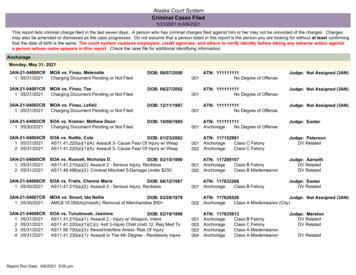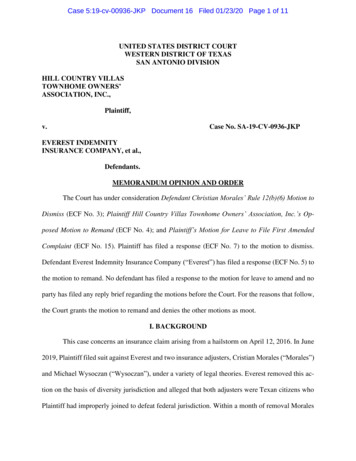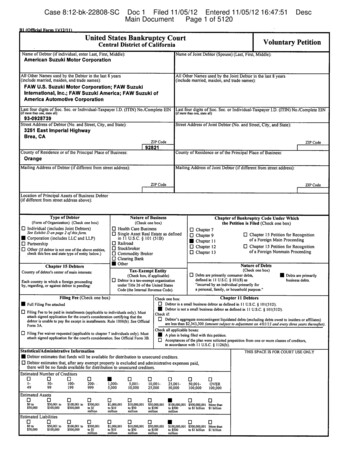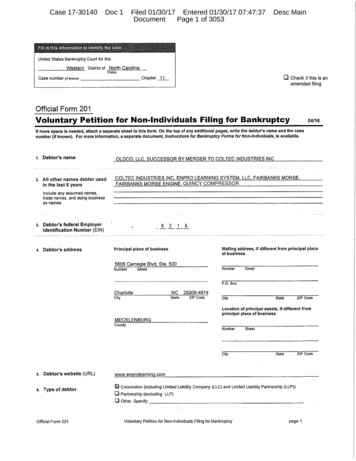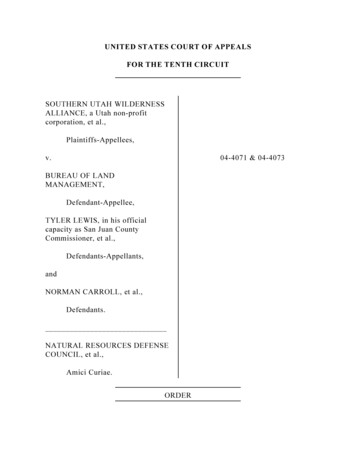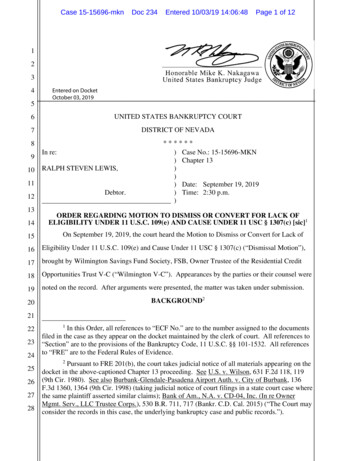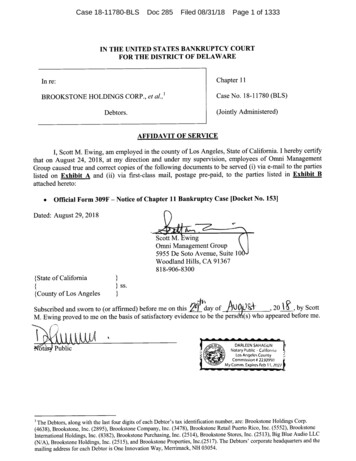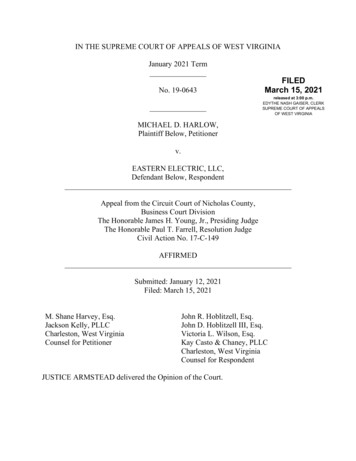
Transcription
IN THE SUPREME COURT OF APPEALS OF WEST VIRGINIAJanuary 2021 TermNo. 19-0643FILEDMarch 15, 2021released at 3:00 p.m.EDYTHE NASH GAISER, CLERKSUPREME COURT OF APPEALSOF WEST VIRGINIAMICHAEL D. HARLOW,Plaintiff Below, Petitionerv.EASTERN ELECTRIC, LLC,Defendant Below, RespondentAppeal from the Circuit Court of Nicholas County,Business Court DivisionThe Honorable James H. Young, Jr., Presiding JudgeThe Honorable Paul T. Farrell, Resolution JudgeCivil Action No. 17-C-149AFFIRMEDSubmitted: January 12, 2021Filed: March 15, 2021M. Shane Harvey, Esq.Jackson Kelly, PLLCCharleston, West VirginiaCounsel for PetitionerJohn R. Hoblitzell, Esq.John D. Hoblitzell III, Esq.Victoria L. Wilson, Esq.Kay Casto & Chaney, PLLCCharleston, West VirginiaCounsel for RespondentJUSTICE ARMSTEAD delivered the Opinion of the Court.
SYLLABUS BY THE COURT1.“In reviewing challenges to the findings and conclusions of the circuitcourt made after a bench trial, a two-pronged deferential standard of review is applied. Thefinal order and the ultimate disposition are reviewed under an abuse of discretion standard,and the circuit court’s underlying factual findings are reviewed under a clearly erroneousstandard. Questions of law are subject to a de novo review.” Syl. Pt. 1, Pub. Citizen, Inc.v. First Nat. Bank in Fairmont, 198 W. Va. 329, 480 S.E.2d 538 (1996).2.“There is authority in equity to award to the prevailing litigant his orher reasonable attorney’s fees as ‘costs,’ without express statutory authorization, when thelosing party has acted in bad faith, vexatiously, wantonly or for oppressive reasons.” Syl.Pt. 3, Sally-Mike Prop. v. Yokum, 179 W. Va. 48, 365 S.E.2d 246 (1986).3.“As a general rule of statutory construction, the word ‘may’ inherentlyconnotes discretion and should be read as conferring both permission and power. TheLegislature’s use of the word ‘may’ usually renders the referenced act discretionary, ratherthan mandatory, in nature.” Syl. Pt. 1, Pioneer Pipe, Inc. v. Swain, 237 W. Va. 722, 791S.E.2d 168 (2016).4.West Virginia Code § 31B-7-702(d) (1996) does not require a courtto award attorney fees or expenses, rather, the decision is left to the discretion of the trialcourt.i
5.“The decision to award or not to award attorney’s fees rests in thesound discretion of the circuit court, and the exercise of that discretion will not be disturbedon appeal except in cases of abuse.” Beto v. Stewart, 213 W. Va. 355, 359, 582 S.E.2d802, 806 (2003).ii
Armstead, Justice:Petitioner, Michael D. Harlow, was once one of three members ofRespondent, Eastern Electric, LLC (“Eastern”). During such association, Eastern lostnearly 400,000 in a prevailing wage case. Following this loss, Mr. Harlow dissociatedfrom Eastern, and Eastern tendered a timely offer to purchase his interest. Mr. Harlowrejected Eastern’s offer, and when negotiations failed, Mr. Harlow sued Eastern to enforcehis statutory right to receive “fair value” for his interest. W. Va. Code § 31B-7-701(a)(1996). After discovery, the parties agreed on the value of Mr. Harlow’s interest, but theprocess of reaching settlement left each side convinced that the other had behaved in badfaith. Both sides moved to recover their reasonable attorney fees and expenses pursuant toW. Va. Code § 31B-7-702(d) (1996). After a bench trial, the circuit court denied bothmotions. Mr. Harlow filed this appeal.Based on the record before us, the arguments of the parties, and theapplicable law, we find that the circuit court acted within its discretion in denying Mr.Harlow’s motion for attorney fees and expenses; therefore, we affirm.I. FACTUAL AND PROCEDURAL BACKGROUNDEastern is a West Virginia limited liability company organized in 2000. 1During relevant times, Eastern provided electrical contracting, electrical engineering, andsafety monitoring services. As an electrician, Mr. Harlow focused on the electricalThe record indicates that Eastern changed its name to “Eastern Group,LLC” on March 9, 2018.11
contracting side of the business. The other members focused on engineering and safetymonitoring.In 2011, former employees sued Eastern, alleging that Eastern unlawfullyfailed to pay prevailing wage for work performed for the State of West Virginia (the“Prevailing Wage Case”). Eastern argued that it relied on representations from the WestVirginia Department of Administration in making its decision regarding payment ofminimum wage, but a jury found for the plaintiffs and awarded substantial damages in orabout February or March 2017. After accounting for interest, payroll taxes, and attorneyfees, Eastern valued the judgment at 389,474.In March 2017, Mr. Harlow advised Eastern’s other members, by letter fromhis attorney, that he wished to dissociate from Eastern as of April 14, 2017 (the“Dissociation Date”). The letter acknowledged the existence of “several factors that willmake a payment for his share difficult at this time” and advised that Mr. Harlow was“willing to delay the valuation of his interest until the [Prevailing Wage Case] isresolved[.]” At the time, Eastern was considering whether to appeal its loss in thePrevailing Wage Case. It chose, instead, to file a claim against the Department ofAdministration in the West Virginia Court of Claims (the “Court of Claims Case”). 2With the March 2017 letter, Mr. Harlow’s counsel enclosed a proposeddissociation agreement, and counsel for the parties attempted to reach agreement on theThe West Virginia Court of Claims is now known as the “West VirginiaLegislative Claims Commission.” W. Va. Code § 14-2-4 (2017).22
terms of his departure. These efforts failed, and on May 12, 2017, counsel for Easternserved Mr. Harlow’s counsel with a timely purchase offer pursuant to W. Va. Code § 31B7-701(b). 3 Eastern offered to purchase Mr. Harlow’s interest for either 45,500 (paid infour equal installments) or one-third of the gross proceeds recovered from the Court ofClaims Case. In support of Eastern’s offer—and as required by the statute—Eastern’scounsel enclosed: (a) an explanation of estimated valuation, (b) a “recast” balance sheet,(c) a “QuickBooks” balance sheet, and (d) a profit and loss statement. 43Section 701 provides that[a] limited liability company must deliver a purchaseoffer to the dissociated member whose distributional interest isentitled to be purchased not later than thirty days after the datedetermined under subsection (a) of this section. The purchaseoffer must be accompanied by:(1) A statement of the company’s assets and liabilitiesas of the date determined under subsection (a) of this section;(2) The latest available balance sheet and incomestatement, if any; and(3) An explanation of how the estimated amount of thepayment was calculated.W. Va. Code § 31B-7-701(b).According to the enclosed explanation of estimated valuation, the “recast”balance sheet showed the fair market value of assets and liabilities as of the DissociationDate; the “QuickBooks” balance sheet, by contrast, showed original asset costs andaccumulated depreciation. The profit and loss statement purported to show 2017 businessresults up to the Dissociation Date.34
Mr. Harlow rejected Eastern’s offer, arguing that it undervalued thecompany’s assets and that he was entitled to a share of any net recovery in the Court ofClaims Case. He denied, however, that he had any responsibility to reimburse Eastern ifthe amount recovered in the Court of Claims Case was less than the cost of pursuing theclaim. Litigation costs, he argued, were a company expense that he had funded throughhis efforts as a member. He further contended that his wife, attorney Martha Harlow, had“devoted substantial time during the [Prevailing Wage Case] to the Company’s affairs”without compensation. He felt “sure that his contributions to the Company, and thecontributions of his spouse, during the litigation” were greater than his share of anypotential loss Eastern might suffer in the Court of Claims Case.In October 2017, Mr. Harlow advised Eastern that he had retained an expertto value his interest and approximately one month later the parties entered into anagreement to toll Mr. Harlow’s statutory deadline to sue. 5 The tolling agreement, whichpurported to extend the deadline to February 2018, also required Eastern to cooperate withthe expert’s information requests “in good faith” and within five business days.Mr. Harlow’s expert issued his first information request in October 2017,before the tolling agreement was signed. A supplemental request was issued in November2017. Eastern responded to the first request in December 2017, but response to theSee W. Va. Code § 31B-7-701(d) (“If an agreement to purchase thedistributional interest is not made within one hundred twenty days after the date determinedunder subsection (a) of this section [i.e., the Dissociation Date], the dissociated member,within another one hundred twenty days, may commence a proceeding against the limitedliability company to enforce the purchase.”).45
supplemental request was delayed until February 2018, largely, it seems, due to a changein representation. 6Meanwhile, Mr. Harlow sued Eastern in the Circuit Court of NicholasCounty in December 2017. Mr. Harlow refrained from serving Eastern, however, untilFebruary 2018, when Eastern’s new counsel agreed to accept service. Eastern answeredthe complaint, and the case was referred to the Business Court Division. 7 A schedulingorder was issued in May 2018. According to the scheduling order, Mr. Harlow was toprovide “all discovery concerning the fair market value of the distributional interestincluding all expert opinions” in August 2018; Eastern’s discovery and expert opinionswere due in November 2018.Mr. Harlow served his first formal discovery requests in June 2018, andsubsequent discussion between counsel revealed a key point of contention between theparties: whether Eastern had fully disclosed its accounts receivable as of the DissociationDate. Mr. Harlow believed that Eastern had not, and in July 2018, he served three ofEastern’s customers with subpoenas.Eastern moved to quash the subpoenas, but one customer responded beforeEastern filed its motion. This customer disclosed a 95,152 invoice from Eastern datedApril 18, 2017. The invoice—which was signed four days after the Dissociation Date—In December 2017, Eastern’s counsel was confirmed as the United StatesAttorney for the Southern District of West Virginia. In or about February 2018, Eastern’srepresentation shifted to the law firm that represents Eastern in this appeal.67See W. Va. Tr. Ct. R. 29.06 [2014].5
certified that the amount due was for completed work, yet it also indicated that it was forthe period ending on April 30, 2017. Mr. Harlow’s valuation expert assumed that the entireamount of the invoice was for work performed before the Dissociation Date and, aftermaking further estimated adjustments for other customers, increased Eastern’s accountsreceivable, as of the Dissociation Date, by 137,428.Based on these and otheradjustments, Mr. Harlow’s August 2018 expert report valued his one-third interest at 120,000. 8In September 2018, after serving Eastern with his expert opinion, Mr.Harlow’s attorney sent Eastern’s attorney a long letter objecting to Eastern’s discoveryresponses. 9 However, later that month, when the circuit court heard Eastern’s motion toquash, the circuit court objected to Mr. Harlow’s decision to issue his expert report beforecompleting discovery. According to the court, “[i]f the Plaintiff needed the subpoenaedinformation so much, then Plaintiff should have sought relief from the SchedulingOrder[.]” Nevertheless, the parties were able to stipulate that documents relating to workperformed up to the Dissociation Date would be produced under the subpoenas. CertainThis amount was “exclusive of” any recovery in the Court of Claims Case,which the expert considered speculative and “not without risk.”8Eastern served its first discovery response in July 2018 and supplementedits response in August 2018.69
other requested information, however, was deemed “not relevant[,]” and Mr. Harlow’ssubpoenas were quashed to the extent they sought such information. 10Eastern supplemented its discovery responses a second time in October 2018,providing payroll summaries, timesheets, and other documents for the period immediatelyprior to the Dissociation Date.In November 2018, Eastern’s expert completed hisvaluation report, which valued Mr. Harlow’s one-third interest at 69,814. 11 Eastern’sexpert explained that this lower value was due, in part, to different conclusions aboutEastern’s accounts receivable and to the opposing expert’s failure to account for accruedexpenses.After changing attorneys, Mr. Harlow renewed his discovery efforts inDecember 2018, filing a motion to compel discovery and serving a new round ofsubpoenas. He also sought to add three new parties. 12 Eastern opposed these efforts andfurther supplemented its discovery responses. Following a hearing in February 2019, thecircuit court quashed the subpoenas and denied Mr. Harlow’s request to add new parties.The circuit court did, however, grant a portion of the motion to compel discovery, orderingDocuments produced before Eastern filed the motion to quash were to besubject to a separate agreed protective order.10This figure does not account for any potential recovery from the Court ofClaims Case, which the expert considered “a contingent asset and . . . not capable ofprediction.”11Mr. Harlow proposed to name as defendants the two remaining membersof Eastern and a closely related limited liability company.712
Eastern to permit Mr. Harlow, his attorney, and his expert to inspect Eastern’s records fortwo prominent customers.During the February 2019 hearing, the circuit court advised that Mrs. Harlowcould not attend the records inspection unless she filed a notice of appearance as counselfor her husband. Mrs. Harlow subsequently filed a notice of appearance in March 2019,and Eastern moved to disqualify and enjoin her from providing assistance to Mr. Harlowor his attorney based on her work for Eastern during the Prevailing Wage Case. 13 Inresponse to the motion, Mrs. Harlow filed a lengthy declaration describing the extent ofher involvement in both cases. After a hearing, the circuit court found a conflict of interestand disqualified Mrs. Harlow from appearing as counsel in the matter, noting Mr. Harlow’sproposal to use the value of Mrs. Harlow’s work on the Prevailing Wage Case as a“possible offset” against losses in the Court of Claims Case. 14 The court did not, however,enjoin Mrs. Harlow from consulting with Mr. Harlow or his attorney.In April 2019, the parties’ experts submitted revised reports that narrowedthe gap between the parties’ positions. Eastern’s expert valued Mr. Harlow’s one-thirdinterest at 79,209; Mr. Harlow’s expert valued it at 100,000. 15Eastern filed the motion to disqualify in March 2019 the same day as and,indeed, before Mrs. Harlow filed her notice of appearance.13In April 2019, Mr. Harlow moved for relief from Mrs. Harlow’sdisqualification after Mr. and Mrs. Harlow signed a release of any claim for compensationfor the “legal support” she provided to Eastern during the Prevailing Wage Case. Thismotion was later withdrawn.1415Neither expert assigned a value to the Court of Claims Case.8
The parties agreed to value Mr. Harlow’s interest at 100,000 plus a third ofany net proceeds from the Court of Claims Case. Nevertheless, both sides sought to recovertheir attorney fees and expenses and filed motions to that end. In his motion, Mr. Harlowinvoked W. Va. Code § 31B-7-702(d) (authorizing a statutory award of attorney fees andexpenses when a party “acted arbitrarily, vexatiously or not in good faith”) and SyllabusPoint 3 of Sally-Mike Properties v. Yokum, 179 W. Va. 48, 365 S.E.2d 246 (1986)(authorizing an equitable award of attorney fees when a party “acted in bad faith,vexatiously, wantonly or for oppressive reasons”). He accused Eastern of bad faith 16 dueto Eastern’s alleged (a) concealment of accounts receivable, (b) failure to producedocuments, 17 (c) tender of a deficient purchase offer, and (d) efforts to disqualify Mrs.Harlow. 18 Mr. Harlow did not, however, separately accuse Eastern of acting arbitrarily.Rather, he contended that “clear and convincing evidence [supported] a finding that[Eastern] ha[d] acted ‘arbitrarily, vexatiously, or not in good faith’ for purposes of” thestatute “and/or” Sally-Mike Properties. (Emphasis added.)Mr. Harlow also accused Eastern of vexatious attacks on Mrs. Harlow, butthe overall thrust of his argument was that Eastern acted in bad faith.16Mr. Harlow argued that Eastern failed to provide company recordspursuant to W. Va. Code § 31B-4-408(a) (1996) (requiring limited liability companies to“provide former members and their agents and attorneys access for proper purposes torecords pertaining to the period during which they were members.”).17Eastern’s counsel also referred Mrs. Harlow to the Office of DisciplinaryCounsel. Mr. Harlow argued that this was further evidence of bad faith.918
In May 2019, the parties appeared for a one-day bench trial on theirrespective motions for attorney fees and expenses. Witnesses included Eastern’s businessmanager and two attorneys. 19 The business manager described Eastern’s circumstances inthe spring of 2017 and explained Eastern’s discovery responses. The attorney witnesses,who formerly represented the opposing parties during discovery, 20 testified about theiractivities and interactions. In all, the circuit court received fifty-two exhibits as evidence,thirty of which came from Mr. Harlow.After trial, the parties submitted proposed findings of fact and conclusions oflaw. Mr. Harlow’s proposed order contained an extensive summary of the evidence andprovided what he considered to be the relevant law, including definitions for “clear andconvincing evidence,” “bad faith,” and “vexatious.” He then presented his proposedconclusions of law:(a) that Eastern’s May 2017 purchase offer was statutorilyinadequate 21 and made in bad faith; (b) that Eastern concealed accounts receivable in badfaith and arbitrarily failed to engage in efforts to resolve the parties’ dispute; (c) thatEastern withheld and delayed production of records in bad faith; (d) that Eastern engaged19Mr. Harlow’s valuation expert was the fourth witness.As noted above, Eastern’s first attorney left the case in December 2017when he became the United States Attorney for the Southern District of West Virginia.Eastern’s second attorney, who testified as a witness for Eastern, entered the case in orabout February 2018 and remained in the case until in or about December 2018. Mr.Harlow’s first attorney of record, who testified for Mr. Harlow, remained with him until inor about November 2018.20Mr. Harlow asserted that Eastern’s offer violated the statute because itfailed to offer “fair value.” See W. Va. Code § 31B-7-701(a).1021
in “late stage” attacks on Mrs. Harlow and other vexatious conduct 22 that contribute to afinding of bad faith; and (e) that the foregoing activities “met one or more of [the]‘arbitrary, vexatious, and not in good faith’ standards” under the statute[23] and “bad faith”under Sally-Mike Properties. (Emphasis added.)The circuit court rejected both parties’ motions by order entered on June 19,2019. Mr. Harlow appeals from that order.II. STANDARD OF REVIEWIn this appeal, we review a circuit court order that was entered following abench trial. Thus, we apply the following standard of review:In reviewing challenges to the findings and conclusionsof the circuit court made after a bench trial, a two-prongeddeferential standard of review is applied. The final order andthe ultimate disposition are reviewed under an abuse ofdiscretion standard, and the circuit court’s underlying factualfindings are reviewed under a clearly erroneous standard.Questions of law are subject to a de
nearly 400,000 in a prevailing wage case. Following loss,this Mr. Harlow dissociated from Eastern, and Eastern tendered a timely offer to purchase his interest. Mr. Harlow rejected Eastern’s offer , and when negot
